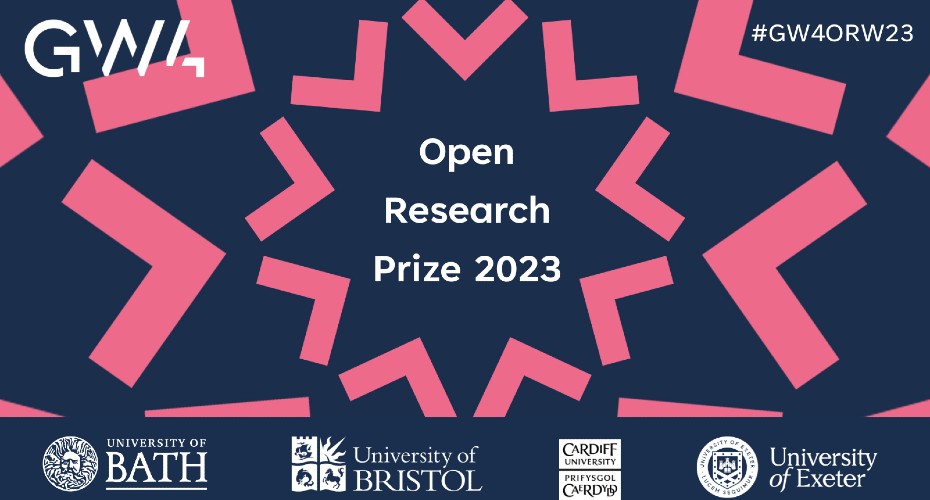Exeter researchers win big in GW4 Open Research Prize 2023

University of Exeter researchers scooped a string of awards at the first ever inaugural GW4 Open Research Prize, celebrating best practice in open research.
Open research is a broad range of practices which, when combined, make research more accessible, transparent, reproducible and visible.
Exeter researchers won first prize on two of four prize categories at the online event, organised by Library Services Teams from across the GW4 Alliance universities and led, for this year, by the University of Bristol. Several University of Exeter submissions were also shortlisted.
Professor Krasimira Tsaneva-Atanasova, Vice-President and Deputy Vice-Chancellor for Research and Impact at the University of Exeter, said: “Congratulations to our successful research teams. I’m delighted to see our commitment to Open Research recognized by these awards. Open Research is important from perspectives including encouraging best practice, allowing data to be shared and re-used by others, and fostering quality control. Greater transparency of work allows for scrutiny and error detection, improving our outputs. Significantly, academic work is often funded through public money and charitable donations. Making our work as open as possible allows those who have funded it to access the findings of our research – increasing its impact.”
The Prize, which was delivered as part of GW4’s Open Research Week – an initiative by the universities of Bath, Bristol, Cardiff and Exeter – was first introduced by the University of Bristol in 2021 to celebrate and recognise the excellent work of researchers in making their research more accessible to all, thereby increasing its potential impact. For 2023, the Prize was extended to researchers from across all four Alliance universities.
Researchers in all disciplines from across the Alliance were asked to submit applications, which demonstrated the listed open research practices, across four different prize categories: Widening Reach; Improving Quality; Poster Session Prize, and the GW4 Early Career Publishing Prize.
The shortlisted applicants were selected to attend a cross-Alliance awards event, where they presented their entries to members of the public, academics and representatives from across the universities, with audience members invited to vote for the winning entries for three of the categories. The winner of the Early Career Publishing Prize was selected by a review panel.
A number of high-quality entries were received from researchers across all disciplines. Four prizes of £250 were awarded across each of the four categories, with the winner of the GW4 Early Career Publishing Prize also invited to take their monograph proposal through the full Bristol University Press (BUP) commissioning process.
James Anthony-Edwards, Chair of the GW4 Library Directors Group and University Librarian at the University of Exeter, said: “In our University of Exeter Strategy 2030, we are committed to research excellence being underpinned and enhanced by an open, ethical and supportive research culture and environment. The GW4 Open Research Prize has been a brilliant opportunity to celebrate the work being carried out by researchers, across the Alliance, and shows the merit of utilising open research practices.”
GW4 Alliance Director, Dr Joanna Jenkinson MBE, said: “We are delighted by the fantastic quality of entries that we’ve received for the GW4 Open Research Prize; the first time that this initiative has been run across all four of the GW4 Alliance institutions. Collaboration and innovation is at the heart of everything we do at GW4, and the calibre of this year’s Prize entries clearly demonstrates the excellent work being carried out by researchers across our universities, to make their research more discoverable and accessible by all.”
The Exeter Prize Winners are:
Widening Reach Prize
Matt Lloyd Jones: Exploring the potential of using simulation games for engaging with sheep farmers about sheep lameness.
Improving Quality Prize
Katie Young, Pedro Cardoso, Laura Guedemann, Rhian Hopkins: Improving reproducibility and transparency of diabetes research with electronic health care records
Runners Up:
Widening Reach Prize
Xinran Du: “Open Science practices benefit researchers and community”
Alison Harper: “A free and open-source simulation tool for orthopaedic elective services planning”
Katie Young, Pedro Cardoso, Laura Guedemann, Rhian Hopkins: Improving reproducibility and transparency of diabetes research with electronic health care records
Sarah Scaife, University of Exeter with the University of Bristol: “And you’ve asked me to think about medicine”
Improving Quality Prize
Matt Lloyd Jones: Exploring the potential of using simulation games for engaging with sheep farmers about sheep lameness.
Rebecca Padget: “Guppies in large groups cooperate more frequently in an experimental test of the group size paradox”
Alison Harper: “A free and open-source simulation tool for orthopaedic elective services planning”



